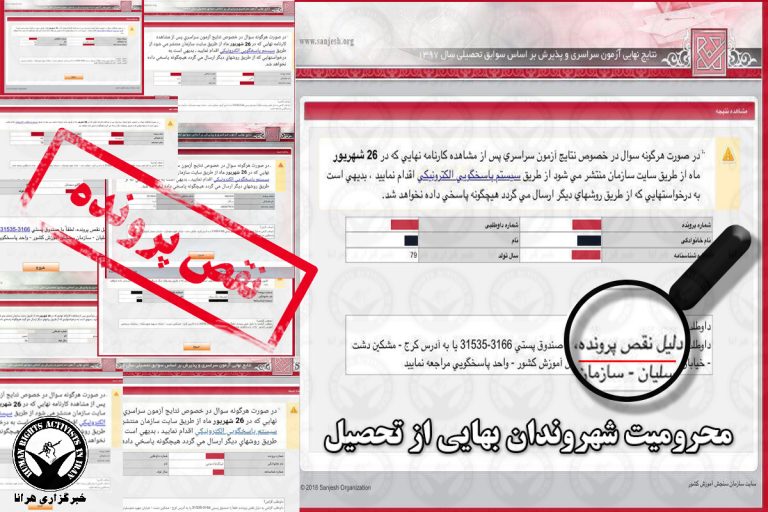Source: www.hra-news.org
Translation by Iran Press Watch

HRANA News Agency- Human Rights Activists News Agency in Iran- the First Branch of the Administrative Court of Appeal upheld the ruling of the initial court regarding the complaint of Taraneh Ghiami, a Baha’i student deprived enrolling in higher education, against the National Testing Organization.
According to HRANA, Branch One of the Administrative Court of Appeals rejected the objection of Baha’i student, Taraneh Ghiami to the ruling of the initial court. In 2014 Ms. Ghiami successfully paassed the 2014 University Entrance exam, however, the National Testing Organization refused to allow her to enroll in University. Ms. Ghiami filed a complaint with the Administrative Justice Court against the National Testing Organization, for the refusal. The rejection of her complaint, four years later, by the First Branch of the Administrative Justice Court was based on the resolution of the Supreme Council of the Cultural Revolution that Baha’is were denied access to universities.
A source close to this Baha’i student told HRANA, “After about 4 years, recently the objection of this Baha’i student to the ruling issued by the Branch One of the Administrative Justice Court on the lawfulness of the action of the National Testing Organization in depriving her of education was heard and denied. This verdict was conveyed to both Taraneh Ghiami and her lawyer. ”
“Taraneh Ghiami participated in the National Entrance Exam in 2014 and after visiting the National Testing Organization site for her score, she noticed she was denied choosing any majors. Following up on the reason, she realized that she was barred from attending college and continuing her studies for her religious belief, just like many other Baha’i students. Pursuing the issue further, she took her case of right to education to the Administrative Justice Court. After a while, the court issued a verdict rejecting her case in accordance with the Supreme Council of the Cultural Revolution decree to deny admittance of Baha’is at universities. ”
After the ruling was issued by the Branch One of the Administrative Court of Justice, through her lawyer, Mustafa Ahmadian, Ms. Ghiani objected to the ruling based on contradiction of the decree of the Supreme Council of the Cultural Revolution and the initial decision of the Administrative Court with Domestic Laws and International Conventions.
It should be noted that this year, at least 58 Baha’is who participated in the National University Entrance Exam (UEE) were denied with the accusation of “Incomplete File” reflected on the site of the UEE. However, the actual reason for their denial is being a Baha’i.
Despite the explicit decree of the law, according to the secret order of the Supreme Council of the Iranian Cultural Revolution, the Bahá’ís are deprived of university studies in addition to being deprived of employment in State Offices.
Every year, there are reports of depriving Baha’i citizens of continuing education at Iranian universities. This includes even those few who (were admitted but) are about to graduate.
On November 19, 2018, HRANA issued an extensive report about the case of oppression of Baha’is in Iran. According to this report, from the beginning of the year till now, Baha’is have been subjected to a new wave of oppressions and gross violation of human rights in different cities of Iran. The deprivation of at least 58 Baha’i students at current year’s University Entrance Exam, the expulsion of at least 11 Baha’i students at different levels of studies from universities, the prohibition of economic activities and the expulsion of at least 6 Baha’is from their own workplace or private companies, the arrest and summon of 72 Baha’is by security forces, the sentencing of 24 Baha’is to a total 46 years of imprisonment and 9 years of exile, the provision of extensive cultural and media campaigns against Baha’is, the shutting down and continued sealing of the Baha’i shops and stores, and the destruction of graves and the prohibition of the burial of Baha’is in their cemeteries in different cities are but a glimpse of the increased systematic pressure on the belivers of this community from the beginning of this year till November 19.
Bahá’ís in Iran are denied the freedom of religious beliefs. This systematic exclusion happens while the Article 18 of the Universal Declaration of Human Rights and Article 18 of the International Covenant on Civil and Political Rights states that everyone has the right to freedom of religion and the conversion of religion with conviction, as well as the freedom to express his belief individually or collectively and publicly or secretly.
There are more than three hundred thousand Baha’is in Iran according to unofficial sources, but the Iranian Constitution recognizes only Islam, Christianity, Judaism and Zoroastrianism as official religions and does not recognize Baha’i Faith. For this reason, Baha’i rights in Iran have been continually and systematically violated in recent years.
January 24, 2019 7:26 pm
Informative.